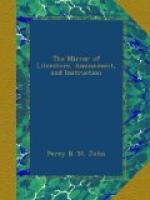He rushes home—he is not there—
With agony and woe;
He hunts him in the cold night air,
O’er hill and vale below.
Morn rose—the faithful dog
appears,
He whines for food so mild,
The father hied him through his tears,
And said, “Tray, where’s
my child?”
Thrice rose the morn—the father’s
heart
With grief was almost dead;
But every morn the dog appeared,
And whined and begged for
bread.
Yet through the night and through the
day,
The dog was never seen—
“He is not wont to stay away,
Where can the dog have been?”
On the fourth morn this faithful friend,
As usual whined for meat—
They mark the way his footsteps tend,
And follow his retreat.
They watch him to a cave beside
The Grampians’ craggy
base—
Behold! the shepherd’s wandering
child
Within the dog’s embrace.
He springs—he weeps away his
cares,
He cries aloud with joy—
He kneels, he sobs to heaven his prayers,
For his redeemed boy.
Then, turning, hugs his favourite hound,
The trusty, true, and bold,
By whom was saved, through whom was found
The firstling of his
fold!
The Engravings, which are very numerous, are exclusively on wood. A few of them are views in the Regent’s Park Gardens; but in point of execution, we think the best is a Portrait of the Satyr, or “Happy Jerry,” at Cross’s Menagerie. Though by no means one of nature’s favourites, he appears to possess the companionable qualities of sitting in a chair, smoking a pipe, and drinking spirits and water, and appearing to understand every look, word, and action of his keeper; indeed, so thoroughly contented is the creature, that he has obtained the name of “Happy Jerry.”
To speak zoologically, next year we hope the artist and editor will put their best feet foremost, and improve upon the present volume. The design is one of the best for a Juvenile Annual—for who does not recollect the very amusing game of “Birds, Beasts, and Fishes, and sometimes Insects and Reptiles.” What a menagerie of guessing novelties would have been a Zoological Keepsake in our school days.
* * * * *
THE GATHERER.
A snapper up of unconsidered trifles.
SHAKSPEARE.
* * * * *
SPILLING THE SALT.
It is a curious fact, though not generally known, that the popular superstition of overturning the salt at table being unlucky, originated in a picture of the Last Supper, by Leonardo da Vinci, in which Judas Iscariot is represented as overturning the salt.
* * * * *




